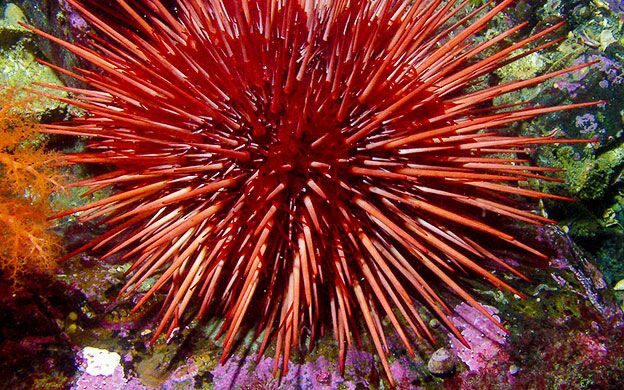MDIBL scientists study ‘ocean Methuselahs’ to learn about aging
 Courtesy / MDI Biological Laboratory
Scientists at MDI Biological Laboratory are studying sea urchins to better understand the process of aging and the regeneration of damaged or lost tissue or body parts. Sea urchins share a close genetic relationship with humans.
Courtesy / MDI Biological Laboratory
Scientists at MDI Biological Laboratory are studying sea urchins to better understand the process of aging and the regeneration of damaged or lost tissue or body parts. Sea urchins share a close genetic relationship with humans.
Scientists at the MDI Biological Laboratory in Bar Harbor have discovered a contradiction in the current thought on some aspects of aging by studying sea urchins, some of which have a life expectancy of more than 100 years and share a close genetic relationship with humans.
James Coffman, associate professor at the lab, and collaborator Andrea Bodnar of the Bermuda Institute of Ocean Studies, studied the capacity of sea urchins to regenerate tissues and lost or damaged body parts in the hope of better understanding the aging process in humans. They published a paper on the topic in the scientific journal Aging Cell.
Some species of sea urchins can quickly regrow damaged spines and feet and even live to very old ages with good health. They can even reproduce as if they were still young.
The scientists looked at three species of sea urchins that had short, medium and long life spans. They expected sea urchins with short life expectancies to experience a decline in their ability to regenerate tissues as they age, which follows the prevailing theory. However, they found that regenerative capacity was not affected by age.
“We [originally] wanted to find out why the species with short and intermediate life expectancies aged and the long-lived species didn’t,” Coffman said in a statement. “But what we found is that aging is not inevitable; sea urchins don’t appear to age, even when they are short lived.”
He added, “Because these findings were unexpected in light of the prevailing theories about the evolution of aging, we may have to rethink theories on why aging occurs.”
The researchers said they plan to further study why short-lived sea urchins don’t experience cell deterioration with age. In particular, they want to look at the role of the immune system in maintaining youthful function into old age.
The research was funded by various grants including from the National Institute on Aging, the Bermuda Charitable Trust, the Institutional Development Awards and the National Institutes of Health.
MDI Biological Laboratories will be sponsoring a course on aging for worldwide experts in Bar Harbor from June 19 through July 3. Twenty early-career scientists and more than 20 experts on aging are expected to attend.
Read more
MDI Bio Lab discoveries might advance heart repair
MDI Bio Lab awarded $20K for aging research program
Living to 150? Two scientists make a $300 bet with a $500M payoff










Comments